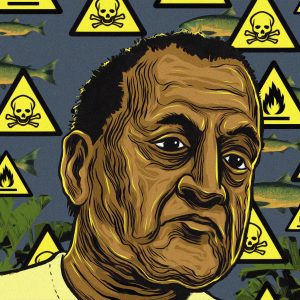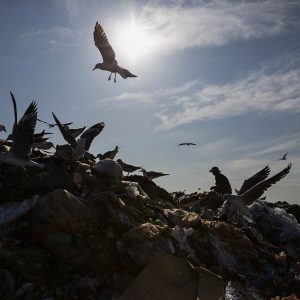Breathless between Covid-19 and pollution
Residents in South Durban fear they will more easily succumb to the virus because of being chronically exposed to deadly fumes emitted by the surrounding oil and gas refineries.
Author:
21 September 2020

Felicity Ramdial, 54, moved to Merebank 36 years ago. She says soon thereafter her breathing problems started.
Merebank, in the South Durban Basin, is situated in an area with one of South Africa’s largest concentrations of petrochemical industries. The South Durban Basin also includes areas such as Bluff, Clairwood, Wentworth, Isipingo and Lamontville.
Ramdial says after 36 years she is used to the foul smell from the nearby industries. “We don’t know what fresh smells like anymore, but what can we do? This is as good as it’s going to get for us. We’ve been suffocating from the fumes that often lead to deadly respiratory diseases and there’s nothing we can do about it. These chemical and oil firms are built around us, but they are bigger than us. To them we are insignificant,” she says.
Related article:
“Three years ago, a gas leak from [the] Engen refinery caused serious nerve damage that left my son with permanent disability. We’ve been exposed to fumes each day, and while the smell has become normal, it gradually harms our health. The fumes are the harshest to our children and the elderly,” says Ramdial.
Following a more recent gas leak of methyl mercaptan at the Engen refinery in July 2020, the eThekwini Municipality undertook to ensure that such leaks do not recur. According to media reports, Engen admitted the leak.
Engen, however, declined to comment on questions from Spotlight for this article, stating that they are too often made out as “the bad guys in the media”.
Sagren Govender, 47, says he suffers from chronic obstructive pulmonary disease (COPD) – a chronic inflammatory lung disease. “I arrived in Merebank in 1987. Three years later my health gradually deteriorated,” he recalls. “Now, walking anywhere leads to shortness of breath. I use three types of chronic treatment to help me breathe better, at least five times a day.” This, Govender says, includes a nebuliser, oral medication and two inhalers.

Govender says for those staying in the area, fresh air is just a dream.
“We’re literally suffocating. During this pandemic, there are some days when we can barely breathe. We are experiencing double life threats. It’s all in the air. We wear masks to protect us from Covid-19, but the daily air we breathe has been poisoned slowly and silently killing all of us,” he says. “Clean air seems to be a privilege that poor South Africans cannot attain. These firms can buy and sell us for 10 times our worth. To them it’s just business as usual, despite the fatalities and permanent health damage caused by their factories and refineries.”
Air pollution and health risks
That dirty air can harm people’s health is well established. A 2017 Lancet Commission on pollution and health found that “diseases caused by pollution were responsible for an estimated 9 million premature deaths in 2015 – 16% of all deaths worldwide – three times more deaths than from Aids, tuberculosis and malaria combined and 15 times more than from all wars and other forms of violence”. Of these 9 million deaths, an estimated 6.2 million was specifically due to air pollution. As pointed out in the commission, various types of air pollution are associated with diseases as wide-ranging as asthma, COPD, heart disease and stroke.
In research on the human health impacts of air quality in Southern Africa, researchers write that it is “well known that air pollution impacts human health negatively” but also note that “quantifying the impact of air pollution on human health in Southern Africa is a challenge due to the limited availability of data at the appropriate scale and spatial representation”.
Related article:
This lack of monitoring and systematic data collection makes it hard to prove whether a specific leak or chronic air pollution in an area is what is making people sick.
But in addition to the confirmed leaks at Engen, some studies do however seem to confirm that there is a problem in the Merebank (South Durban Basin) area. A study done among school children in the north of Durban and the more industrialised areas in the South such as Merebank, found that the children in the South were more likely to have persistent asthma than children from communities distant from industrial sources.
Bongani Mthembu, air quality officer at the South Durban Community Environmental Alliance (SDCEA), says some gases that have been monitored in the South Basin area include methyl mercaptan and different types of volatile organic compounds including benzene, sulphur dioxide and nitrogen dioxide.
“Methyl mercaptan depresses the central nervous system and affects the respiratory centre, producing death by respiratory paralysis when in higher outdoor concentration,’ says Mthembu. “Higher outdoor concentrations of nitrogen dioxide, nitrogen oxides and sulphur dioxide also in the area, are associated with poor lung function.”

Air pollution and Covid-19
In something of a silver lining to the massive disruption brought on by the pandemic, preliminary satellite data from the Council for Scientific and Industrial Research (CSIR) showed a decrease in the levels of air pollution during South Africa’s Covid-19 lockdown.
Back in the South Durban Basin, however, all industries have since resumed activities and some people are worried that air pollution might make people more vulnerable to Covid-19.
Desmond D’Sa, an environmental justice activist at SDCEA, warns that resuming operations at the petrochemical firms may result in increased rates of Covid-19 cases. He adds that people living with poor air quality may be more susceptible to Covid-19.
Related article:
While a link between air pollution and Covid-19 has not been definitively established, Caradee Wright, specialist scientist at the South African Medical Research Council leading the Climate and Health Research Programme, says the possibility of such a link cannot be discounted. “Given that air pollution exposure is associated with respiratory health, and the SARS-CoV-2 virus (that causes Covid-19) affects the respiratory system (among other systems) there may very well be increased risk but more research, including research in South Africa, is needed,” says Wright.
Be that as it may, Mthembu says Covid-19 has created huge panic in communities, especially those who stay near polluting industries. “The lockdown has not been easy for many. During level five and four, residents had to coexist with industries that pollute the environment, experiencing a double dose of trauma – that is of being under lockdown while suffering from the slow poisonous chemicals forcing its way into their homes [and] invading their privacy like a criminal holding them hostage,” says Mthembu.

Government response
In March, Mineral Resources and Energy Minister Gwede Mantashe announced the production and distribution of petroleum products is an essential service, meaning operations could continue despite lockdown.
At roughly the same time the Department of Environmental Affairs, Forestry and Fisheries, effective from 1 April, set the minimum emission limit for sulphur dioxide pollution at 1 000mg/Nm3 despite calls from some for a stricter limit of 500mg/Nm3. When slammed as “lax” and “doubly weak” (the emissions limit) by organisations such as the Centre for Environmental Rights, Department of Environmental Affairs, Forestry and Fisheries Minister Barbara Creecy, in a statement, said, “the revised limit of 1000mg/Nm3 will achieve a 58% reduction in total emissions – it will significantly improve compliance compared to the current state of air, in which sulphur dioxide emissions are measured at 3500mg/Nm# and above”.
In response to complaints about air pollution and environmental degradation specifically in the South Durban Basin, the department in July hosted a virtual stakeholder meeting with local environmental lobbyists, experts and government officials.
One key theme in the meeting, as in many discussions about air pollution, was the lack of reliable data.
Related article:
Rico Europido, environmental health campaigner from the environmental justice organisation Groundwork says the current state of the air quality in the South Durban Basin has not been made available to the public because it does not exist. “EThekwini Municipality has failed to update air quality data and they have repeatedly undermined their own efforts due to corruption,” he says. “All plans that have been introduced have never provided accurate data because a health surveillance study has never taken place.”
The need for health and pollution research in the South Durban Basin is recognised by government. In June, Creecy told parliament that the terms of reference (TOR) for a study was being concluded and that there would be wide consultation on the TOR. She said they plan to appoint a service provider during this financial year and start the actual work in the next financial year (2021/22).
In the South Durban meeting, Dr Vincent Gololo, from the Department of Environmental Affairs, Forestry and Fisheries, noted that it has been almost 20 years since the previous health study and it is time for a detailed study to understand the health impacts of the current levels of air pollution in the South Durban Basin. Supporting the objectives of the study, Gololo said the new study is “aimed at determining the current health status of the population by assessing the health impacts of current pollutants to different sub-populations and to provide baseline information that will inform the revision of relevant air quality planning tools”.
Gololo added that the scope and extent of the proposed study will look into community health surveys, medical surveys including lung function assessments and allergy testing, and human health risk assessments to understand the relationship between human health and ambient air pollution.
Air pollution reduction plans needed
But chief specialist in occupational and environmental health at the University of KwaZulu-Natal Professor Rajen Naidoo says instead of another study, what is needed is more emphasis on the air pollution reduction plans.

“To carry out a proper health study is costly. Locally and even globally, there has been extensive research on the impact of air pollution on people’s health and the environment. Now, we must work on interventions to reduce the air pollution providing healthcare services to the communities in South Durban,” says Naidoo. “What is the use of research and studies without implementation of solutions? If the government has the money to establish another study, they should instead use it to support interventions and improve the technologies and tighten regulations and enforcement towards the companies who break the environmental laws.”
Naidoo said people in the South Durban Basin are prone to suffer from respiratory illnesses, heart diseases and cancer, so community health services should be prioritised. “To monitor and evaluate this, permanent health clinics and medical assistance should be established and accessed by the residents,” says Naidoo. “We can’t prove which companies are responsible because it’s an entire collective and mixture of pollutants that affect individuals differently, which makes it easier for the companies to evade liability.”
This article was first published by Spotlight.




